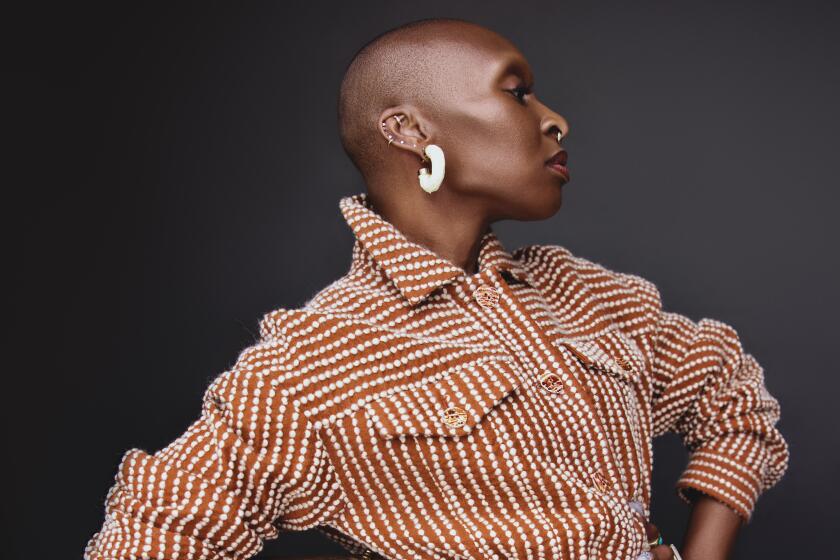‘Where the God of Love Hangs Out’ by Amy Bloom

- Share via
Where the God of
Love Hangs Out
Fiction
Amy Bloom
Random House: 206 pp., $25
Imagine a store that sells different kinds of strength. Like the insurance company that promises to find just the right policy for your needs, this store would help you find exactly the strength you need: strength to leave, strength to stay, strength to lose (a limb, a spouse), strength to accept, strength to absorb cruelty and still be a good person. “Where the God of Love Hangs Out” is a strength store in book form. Amy Bloom’s first collection of stories, “Come to Me” (1993), was about different kinds of love, so it makes sense that Bloom would be well-positioned to write about strength. You can’t have one without the other. Salt and pepper; bread and water.
The first thing you notice in this wise and resounding collection, this community of linked stories, is Bloom’s familiarity with her audience. She has a kitchen-counter style that may or may not come from her years as a psychotherapist. “It’s all just as bad as it sounds,” she asides to her reader; a shortcut, a nod to the ramifications of an affair between two in a lifelong foursome of friends: William and Clare cheat on spouses Isabel and Charles. William and Clare belong together; ramifications or no. Stories come to a grinding halt, as every writer, psychologist, human being knows, when the creator starts judging her characters. Instead, a real writer plays the “sin” out, over an afternoon, a few years, a couple of generations.
Time passes in jerky leaps: a year and a half later, five years later, two wars later. Here, Bloom joins the ranks of the unforgettable: F. Scott Fitzgerald’s eyeless time; Virginia Woolf’s impassivity in the progress of her characters’ lives. This little dust ball -- love between two people and the atomic risks that must be taken to see that it lives -- gathers characters around it. Children have children; friendships last, households grow to sloppy fiefdoms and boom! bang! before you know it, community is created on a series of dumb, flat pages, started with a strong love, often held together by a preternaturally strong woman, the human sacrifice who dies with a big smile on her face.
As for plot, Bloom’s stories move, New York style, toward the next bad thing. Every happiness is followed by hardship; there’s no escaping the inevitability, the yin and the yang. How is the hardship handled? Heavy drinking? Acerbic wit that curdles into bitterness? Stoicism? An over-emphasis on cleanliness? Bloom plays out all the possibilities.
Complicating everything is the human tendency toward delusion, “the lush, streaming light of what is not.” Sometimes, as in “The Old Impossible,” magical thinking is a way of imagining a better future. In other places, as in the title story, the overwhelming desire to have a “normal” life fuels the fantasy. Sometimes a willful evenness, the careful managing of emotions is all it takes to keep the faulty present at bay: “Clare is good, spiky company, and she is the very best companion to have in a bad situation. Trouble brings out the cheer beneath her darkness, unlike everyday life, which tends to have the opposite effect, and she holds her liquor like an old Swede, but Charles has to put up with that squinty, unyielding nature, and he does it with real grace.” And then there are the times when no amount of “managing” can smooth a path to a desirable future, when words fall flat because there’s no way to arrange the truth. “By-and-By,” a story about a girl murdered by a serial killer, is like that. And Bloom lets it be like that -- the girl’s mother talking to the girl’s roommate on the phone; the killer’s sister fixing him dinner and hiding him from the police. It’s hard to make beauty out of some things.
Linked stories capture time in a unique way -- its jolting, jarring, scary, inevitable, shoulder-shrugging essence. They are a big help for a reader, mired in the present, trying to conjure the next phase, the next generation. Maybe you can’t imagine how things will turn out, but Amy Bloom can.
Salter Reynolds is a critic in Los Angeles.
More to Read
The biggest entertainment stories
Get our big stories about Hollywood, film, television, music, arts, culture and more right in your inbox as soon as they publish.
You may occasionally receive promotional content from the Los Angeles Times.








